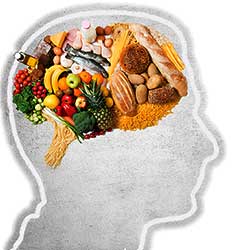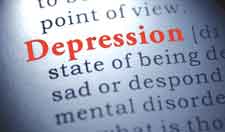A Diet for a Kinder Planet
Considered essential for good health, a wholesome diet and good nutrition may also help improve the behavior and mood of society at large.

Good nutrition is a prerequisite for proper development of the human body after conception, and it is considered a crucial factor in the prevention of chronic disease. It is widely accepted that cancer, cardiovascular disease, diabetes, obesity, and other manifestations of chronic inflammation can be controlled or averted with a nutritious diet. Consequently, the food and nutrition policies of the United States, the United Kingdom, Canada, and other wealthy countries have focused almost exclusively on how diet affects physical well-being, recommending proper caloric and nutrient intakes for a healthy heart and healthy teeth, bones, and weight. However, these policies make little or no reference to the human brain, which is the most complex part of the body.
The brain regulates the functioning of vital bodily organs, is the center for intelligence and emotional response, and consumes approximately 20% of the body’s caloric energy. The brain is also responsible for the expression of personality, mood, and behavior—all of which define humanity. Yet wealthy countries with diverse and extensive food and nutrition policies focused on healthy bodily functions and physical well-being have largely ignored the importance of proper brain function and behavioral well-being. As a consequence, Westernized countries such as the United States and the United Kingdom have experienced a precipitous rise in aggression, irritability, impulsivity, and other antisocial behaviors. Are these displays simply a consequence of the extensive free will enjoyed by Americans, Britons, and others, or is something else at play? A fascinating field of research suggests that depression, aggression, impulsivity, and other displays of antisocial behavior may be the result of nutrient deficiencies in the brain and that certain foods and the nutrients they contain may curtail the expression of antisocial behavior.
The notion that improper nutrition, not accountability and free will, may be responsible for the poor moods and behaviors people exhibit may seem unorthodox, but it is not a novel concept. For decades, scientists, clinicians, and mental health professionals have known that inadequate nutrition has a profound influence on neurocognitive development and mental health. In 1942 physician Hugh Sinclair advised the British government to supplement children’s diets with cod liver oil and orange juice, speculating that a nutrient-poor diet would lead to antisocial behavior (Regoli et al., 2014). In 1968, renowned chemist Linus Pauling unveiled a paper on orthomolecular psychiatry, in which he discussed the effects of micronutrient deficiency on mental health and advocated for the use of vitamins and minerals to treat mental illness (LPI, 2008). And in the late 19th century, well before Sinclair and Pauling, Italian criminologist Cesare Lombroso proposed that the aggressive tactics of terrorists were the result of nutritional deficiencies (Bohannon, 2009). The diet-mind connection encompasses not only the onset and severity of mental illness but also the expression of personality, mood, and behavior. For example, some people experience a sense of euphoria while eating chocolate while others feel safe, secure, and comforted while digging into a bowl of macaroni and cheese.
Beyond the temporary mood boosts experienced by people consuming their favorite foods, studies indicate that specific nutrients are crucial for the maintenance of peak brain performance. Throughout history, researchers have found nutrient deficiencies in people afflicted with mental illness and, more recently, in those exhibiting antisocial behavior. People experiencing depression have consistently been shown to be deficient in B vitamins, omega-3 fatty acids, and zinc. Individuals exhibiting irritability are commonly deficient in B vitamins, omega-3 fatty acids, and magnesium. In addition, impulsive, aggressive, and even violent behaviors have consistently been shown to be associated with deficiencies in several nutrients, including magnesium, zinc, B vitamins, omega-3 fatty acids, and tryptophan (which is the dietary precursor to serotonin—a chemical in the brain that helps regulate body temperature, attention, and behavior) (Gesch et al., 2002; Conklin et al., 2007; Seo and Patrick, 2008). Studies have even indicated that pronounced hypoglycemia is often present in individuals exhibiting antisocial behavior (Benton, 2007).
--- PAGE BREAK ---
Fatty Acids and Aggression
It therefore seems that sufficient amounts of B vitamins, omega-3 fatty acids, zinc, and tryptophan may be essential for mental balance. The dietary sources of these nutrients are green leafy vegetables, eggs, fruits, fish and seafood, nuts and legumes, and whole grains. These nutrient-dense whole foods are abundantly available to consumers of Westernized diets, yet Western countries have high rates of bullying, depression, deception, public temper outbursts, disregard for laws, and other elements of antisocial behavior ranging from careless to rude to criminal. Psychiatrist and physician Joseph Hibbeln, a clinical investigator specializing in nutritional neuroscience with the U.S. National Institutes of Health, has promulgated a possible reason for this incongruity. According to Hibbeln, significant changes in industrialized food production have caused a sweeping shift in the composition of Western diets. In particular, Hibbeln believes that heavy reliance on producing foods with industrial vegetable oils containing only or mostly omega-6 fatty acids (for example, corn, cottonseed, safflower, and soybean oils) have disrupted the brain’s level of essential omega-3 fatty acids. In addition, alcoholic beverages, which have become ubiquitous at nearly all Western social gatherings, also deplete the brain of omega-3 fatty acids.
 A switch in dietary fatty-acid consumption may seem difficult to accept as a valid cause of antisocial behavior, but a brief review of the brain’s anatomy and biochemistry provides compelling context. Nearly two-thirds (60%) of the brain’s composition is fat, of which most are two types of essential fatty acids: omega-3 and omega-6. In particular, the omega-3 fatty acid docosahexaenoic acid (DHA) makes up a significant proportion of nerve-cell membranes and synapses in the central nervous system; it is the most abundant fatty acid in the brain. Two other omega-3s, eicosapentaenoic acid (EPA) and alpha-linolenic acid (ALA), also play important roles in the brain’s anatomy and function. In Western diets, there are numerous dietary food sources of ALA and the omega-6 fatty acids linoleic acid (vegetable oils) and arachidonic acid (dairy, eggs, meat) but only one dietary food source of DHA and EPA: seafood. If a person does not consume enough DHA and EPA through dietary intake, the body can convert ALA to EPA and subsequently to DHA, but the process is inefficient and the conversion rate is poor (Bradbury, 2011). As a consequence, a typical Western diet contains 14 to 25 times more omega-6 fatty acids than omega-3 fatty acids, which is not ideal (UMMC, 2013).
A switch in dietary fatty-acid consumption may seem difficult to accept as a valid cause of antisocial behavior, but a brief review of the brain’s anatomy and biochemistry provides compelling context. Nearly two-thirds (60%) of the brain’s composition is fat, of which most are two types of essential fatty acids: omega-3 and omega-6. In particular, the omega-3 fatty acid docosahexaenoic acid (DHA) makes up a significant proportion of nerve-cell membranes and synapses in the central nervous system; it is the most abundant fatty acid in the brain. Two other omega-3s, eicosapentaenoic acid (EPA) and alpha-linolenic acid (ALA), also play important roles in the brain’s anatomy and function. In Western diets, there are numerous dietary food sources of ALA and the omega-6 fatty acids linoleic acid (vegetable oils) and arachidonic acid (dairy, eggs, meat) but only one dietary food source of DHA and EPA: seafood. If a person does not consume enough DHA and EPA through dietary intake, the body can convert ALA to EPA and subsequently to DHA, but the process is inefficient and the conversion rate is poor (Bradbury, 2011). As a consequence, a typical Western diet contains 14 to 25 times more omega-6 fatty acids than omega-3 fatty acids, which is not ideal (UMMC, 2013).
An ideal dietary ratio of omega-6 fatty acids to omega-3 fatty acids ranges from 1:1 to 5:1. When these ratios are exceeded, chronic inflammation as well as a variety of physical and mental problems can occur as omega-6 fatty acids are pro-inflammatory and omega-3 fatty acids are anti-inflammatory (Bradbury, 2011; Patterson et al., 2012). The Western diet’s shift over the past 50 years from an emphasis on whole foods and monounsaturated and polyunsaturated fats to an emphasis on processed foods and saturated and trans fats has radically increased the dietary consumption of omega-6 fatty acids. In the human brain, omega-6 fatty acids compete with omega-3 fatty acids for the same metabolic pathways, and Hibbeln, along with other scientists, believes that when this occurs, the body fails to convert ALA to EPA and DHA (Blasbalg et al., 2011). This leads to the body’s use of the wrong type of fatty acids—omega-6s—to form nerve-cell membranes and improper functioning of the neurotransmitters dopamine and serotonin. A dysfunctional (i.e., exaggerated) dopamine response system causes an elevated response to an anticipated reward, and low serotonin levels are a biomarker for increased risk of impulsivity, aggression, depression, and suicide. A reduced or nonexistent capacity to control one’s impulses to act on intense emotions in an aggressive or otherwise inhospitable way has proven to be a key characteristic of antisocial behavior (Conklin et al., 2007; Hart, 2008; Seo and Patrick, 2008; Monahan et al., 2009).
 Research indicates that the earlier deficits in omega-3 fatty acids occur during brain development, the greater the expression of antisocial behavior. In fact, children deprived of a sufficient amount of omega-3 fatty acids from the time they are in the womb through the first few years of life will experience permanent deleterious changes to their brains (Liu et al., 2004; Lawrence, 2006; FHF, 2007). Hibbeln is convinced that the changes in essential fatty acid ratios caused by the mass industrialization of the Western diet constitute “a very large uncontrolled experiment that may have contributed to the societal burden of aggression, depression, and cardiovascular death” (Lawrence, 2006).
Research indicates that the earlier deficits in omega-3 fatty acids occur during brain development, the greater the expression of antisocial behavior. In fact, children deprived of a sufficient amount of omega-3 fatty acids from the time they are in the womb through the first few years of life will experience permanent deleterious changes to their brains (Liu et al., 2004; Lawrence, 2006; FHF, 2007). Hibbeln is convinced that the changes in essential fatty acid ratios caused by the mass industrialization of the Western diet constitute “a very large uncontrolled experiment that may have contributed to the societal burden of aggression, depression, and cardiovascular death” (Lawrence, 2006).
Meanness and Micronutrient Deficiencies
Acknowledging that omega-3 fatty acids are an important part of proper brain development and functioning, other researchers maintain that a combination of deficiencies in other key micronutrients as well as omega-3s could be responsible for antisocial behavior. A study by the University of Southern California (USC) suggests that deficiencies in zinc, B vitamins, iron, and certain amino acids (e.g., tryptophan) lead to lower intelligence and higher amounts of antisocial behavior. Specifically, USC researchers found that compared to children without nutrient deficiencies, malnourished children displayed a 41% increase in irritability and aggression at age 8, a 10% increase in aggression and delinquency at age 11, and a 51% increase in violence and other antisocial behavior at age 17 (Liu et al., 2004).
Stephen Schoenthaler, Professor of Sociology, California State University, Stanislaus, has conducted numerous studies investigating the link between poor diet, nutrition deficiency, and antisocial behavior. In one randomized, double-blind, placebo-controlled study of students at elementary schools in Phoenix, Ariz., the participants received either active tablets containing 50% of the U.S. recommended daily allowance of vitamins and minerals or placebo tablets. By the end of the trial, the students receiving active tablets had reduced their engagement in disorderly conduct, defiance, endangerment of others, vandalism, and additional antisocial behaviors by 47% (Schoenthaler and Bier, 2000).
--- PAGE BREAK ---
One of the most referenced and respected studies linking antisocial behavior to nutrient deficiencies in minerals, vitamins, and essential fatty acids was led by Bernard Gesch, Senior Research Scientist at Oxford University. Gesch’s venture into how nutrition affects behavior began through simple observation: “I ran a center that was used by courts as an alternative to custody. Some of our clients would turn up with bags of sweets and be almost uncontrollable. For some, this was their only meal. So we started to prepare a meal together so that they would settle down, and it seemed to work great. We typically learned more about what was happening in [a youngster’s] life during the meal than during our formal offending program.”
 Intrigued by these outcomes, Gesch performed a double-blind, placebo-controlled, randomized study on a prison population, where some of the most extreme antisocial behavior abounds. He administered capsules to two groups of young adult offenders: active capsules containing a combination of micronutrients and placebo capsules containing only vegetable oil. Gesch used micronutrient capsules instead of various nutrient-rich whole foods because the capsules provided known quantities of nutrients, establishing a strong foundation for a double-blind, placebo-controlled analysis. Before the trial, all participating offenders were assessed as having equivalent numbers of disciplinary incidents. By the end of the trial, the prisoners receiving active capsules (i.e., micronutrient supplements) had committed 26% fewer disciplinary offenses than the prisoners receiving placebo capsules and 37% fewer violent offenses overall (Gesch et al., 2002). Some years later, Dutch researchers set out to test Gesch’s findings, and their research yielded similar results (Zaalberg et al., 2010).
Intrigued by these outcomes, Gesch performed a double-blind, placebo-controlled, randomized study on a prison population, where some of the most extreme antisocial behavior abounds. He administered capsules to two groups of young adult offenders: active capsules containing a combination of micronutrients and placebo capsules containing only vegetable oil. Gesch used micronutrient capsules instead of various nutrient-rich whole foods because the capsules provided known quantities of nutrients, establishing a strong foundation for a double-blind, placebo-controlled analysis. Before the trial, all participating offenders were assessed as having equivalent numbers of disciplinary incidents. By the end of the trial, the prisoners receiving active capsules (i.e., micronutrient supplements) had committed 26% fewer disciplinary offenses than the prisoners receiving placebo capsules and 37% fewer violent offenses overall (Gesch et al., 2002). Some years later, Dutch researchers set out to test Gesch’s findings, and their research yielded similar results (Zaalberg et al., 2010).
Like Hibbeln, Gesch believes that the industrialization of the Western diet is a contributing factor to the prevalence of antisocial behavior in Western countries. Although he praises industrialized food production for improving food security and extending life expectancy, he criticizes it for leading to increases in sedentary lifestyles, chronic diseases, and nutrient deficiencies. “The impact of various changes in modern diets … [is] already apparent in global health,” Gesch explains. “Research is emerging that suggests that good nutrition is potentially inexpensive, humane, and effective at promoting health as well as social behavior.” He thus questions the rationale in making sweeping changes to modern Western diets without considering and examining the potential impact on brain development and human behavior. “For years, international standards of dietary adequacy have mainly focused on the dietary requirements of maintaining a healthy heart. This [was] understandable when heart disease was the biggest health risk, but mental illness has overtaken it as the largest health cost. Indeed, given our brain’s remarkably high metabolic activity and nutritional needs, it is quite likely that the first manifestations of a poor diet will be behavioral problems before longer-term health concerns emerge,” Gesch asserts.
Because it is widely accepted that proper nutrition is necessary for good physical health and proper anatomical development of the brain, Gesch sees no controversy in saying that proper nutrition may be a recipe for peace: “We need to rethink our present day attitude to food. Food is not just a commodity; it also fuels our brain and supports our health. It should come as no surprise … that many vitamins, minerals, and essential fatty acids seem to promote aspects of wellbeing whether it be health or behavior—particularly those nutrients that modern dietary practices have rendered less available,” he conveys. To that end, Gesch recently completed a large-scale three-year study to further investigate the effect of a nutrient-rich diet on antisocial behavior. The results of the study have not yet been published, but Gesch provides a few insights: “[The] study is still embargoed, but I can tell you that we replicated an effect where better diet reduced incidents of self-harm. If we take all the results of the double- blind randomized studies of prisoners together, simply consuming broadly [recommended daily allowance] level nutrients on top of their existing diets resulted in [their] committing, on average, 26%–69% fewer offenses compared to placebos.”
Gesch’s, Hibbeln’s, and Schoenthaler’s research and provocative theories on how diet and nutrition affect behavior are receiving worldwide attention, and one reason for the interest is that they may help explain a persistent sociological pattern. For decades, sociologists and scientists have observed and documented that people from low socioeconomic backgrounds tend to engage in more antisocial behaviors than people from middle or high socioeconomic backgrounds. In particular, the worst antisocial behaviors, including violence and criminal activity, tend to be more prevalent among low-income individuals, who consume fewer whole vegetables and fruits and less seafood and have poor access to other resources that promote good overall health (FPH, 2005; Darmon and Drewnowski, 2008; HHS, 2009; Pampel et al., 2010; HSPH, 2014). According to various studies, low-income youth are more likely to have behavioral or emotional problems and are more likely to engage in risky behaviors than youth from middle-income and high-income backgrounds. The risky behaviors include acts of aggression, violence, and delinquency. More notably, low-income youth are more likely to have been charged with a crime by the time they reach 24 years of age (HHS, 2009).
--- PAGE BREAK ---
 Correlation ≠ Causation
Correlation ≠ Causation
Despite these facts, the studies by Gesch, Hibbeln, Schoenthaler, and others demonstrate only a positive correlation between poor diet, nutrition deficiency, and antisocial behavior, and correlation does not indicate causation. Nevertheless, their research is intriguing and certainly warrants further investigation—especially since most conventional methods of abating antisocial behavior have proven to be largely ineffective (Belsky, 2008; NIJ, 2014). In addition, although some of the effects of micronutrients in foods are well-known, many—if not most—of the properties and co-dependent effects of phytochemicals are unknown. Because no nutrient works in isolation, a deficiency in one nutrient may impair the functioning of other nutrients. Thus, a poor intake of nutrient-rich seafood and phytochemical-rich plant foods may have far more influence on the brain and behavior than scientists know. Moreover, a number of non-scientific observational case studies of dietary intervention improving behavior exist. Among the most well-known is a case involving a school in Appleton, Wis.
Appleton Central Alternative Charter High School opened in 1996 as a school for severely at-risk students in grades 10 through 12. The students struggled with behavioral and emotional issues, were markedly disruptive in class, and had frequent run-ins with the law. Before the implementation of a nutrition and wellness program, most of the students at Appleton Central Alternative obtained their meals from vending machines containing candy, chips, sodas, and other foods high in saturated fats, sodium, and sugar but low in micronutrients. After consuming these foods, the students often displayed decreased attention span and increased irritability and impulsivity, including losing tempers, storming out of classrooms, using profane language, and defying authority. Through a partnership with Natural Ovens Bakery (www.naturalovens.com), Appleton Central Alternative began administering a nutritious meal program that included fresh fruit, a salad bar, whole grain breads and bakery products, and milk. According to school staff, the change in student behavior was substantial: Impulsive and disruptive behaviors diminished, and the number of disciplinary referrals to the principal’s office also decreased (ACA Study, 2004).
Equally as compelling is the behavior of citizens in countries where the dietary ratio of omega-3 fatty acids to omega-6 fatty acids is better because of diets consisting predominantly of vegetables, fruit, and seafood. Delinquency is a manifestation of antisocial behavior, so an examination of homicide rates in certain countries provides a metric by which to gauge levels of antisocial behavior. Japan and Iceland, where diets are rich in vegetables and seafood, have the lowest premature mortality rates from homicide (FHF, 2007). Hibbeln and his colleagues at the National Institutes of Health have measured the composition of brain tissue and nerve-cell membranes of people in the United States and compared it to that of people in Japan. The nerve-cell membranes of Americans have a greater content of omega-6 fatty acids (Lawrence, 2006; Lemley, 2014). Hibbeln and his colleagues also compared the level of consumption of omega-6 oils to the rates of homicide and depression in 38 industrialized countries. They found that in industrialized countries where the consumption of omega-3 fatty acids has remained high, rates of homicide and depression are low (Lawrence and Fawcett, 2006). Conversely, industrialized countries with the highest use and consumption of vegetable oils containing omega-6 fatty acids have higher rates of crime and depression.
 The concept of wellness is usually associated with physical well-being, but it also applies to mental well-being. A well-nourished body not only ensures a healthy life but also a healthy brain that is capable of making good decisions that affect humanity in a positive way. While there are likely many factors that precipitate antisocial behavior, nutrient deficiencies may constitute one of them. “A proportion of antisocial behavior appears to be preventable simply by providing children with a more nutritious diet, and there are studies that show this,” Gesch says. In the United States and other industrialized countries, a nationwide shift in the types of foods that are not only consumed but also available to purchase may be a viable approach for fewer displays of antisocial behavior in society and more peace around the world. “The food industry is uniquely placed to do a great good, if it chooses to act accordingly,” Gesch concludes.
The concept of wellness is usually associated with physical well-being, but it also applies to mental well-being. A well-nourished body not only ensures a healthy life but also a healthy brain that is capable of making good decisions that affect humanity in a positive way. While there are likely many factors that precipitate antisocial behavior, nutrient deficiencies may constitute one of them. “A proportion of antisocial behavior appears to be preventable simply by providing children with a more nutritious diet, and there are studies that show this,” Gesch says. In the United States and other industrialized countries, a nationwide shift in the types of foods that are not only consumed but also available to purchase may be a viable approach for fewer displays of antisocial behavior in society and more peace around the world. “The food industry is uniquely placed to do a great good, if it chooses to act accordingly,” Gesch concludes.
References
ACA Study. 2004. Case study: Appleton Central Alternative Charter High School’snutrition and wellness program. http://www.thewholeplate.yihs.net/wp-content/uploads/2010/02/Appleton-school-foodstudy.pdf. Accessed Sept. 4, 2014.
Belsky, J. 2008. Rewards are better than punishment: here's why. Psychology Today, Sept. 25, 2008. http://www.psychologytoday.com/blog/family affair/200809/rewards-are-better-punishment-here-swhy. Accessed Sept. 3, 2014.
Benton, D. 2007. The impact of diet on antisocial, violent, and criminal behaviour. Neurosci. Biobehav. Rev. 31(5): 752–774.
Blasbalg, T.L., Hibbeln, J.R., et al. 2011.Changes in consumption of omega-3 and omega-6 fatty acids in the United States during the 20th century. Am. J. Clin. Nutr. 93(5): 950–962.
Bohannon, J. 2009. The theory? Diet causes violence. The Lab? Prison. Science 325(5948): 1614–1616.
Bradbury, J. 2011. Docosahexaenoic acid (DHA): an ancient nutrient for the modern human brain. Nutrients 3(5) 529–554.
Conklin, S.M., Harris, J.I., et al. 2007. Serum omega-3 fatty acids are associated with variation in mood, personality, and behavior in hypercholesterolemic community volunteers. Psychiatry Res. 152(1): 1–10.
Darmon, N. and Drewnowski, A. 2008. Does social class predict diet quality? Am. J. Clin. Nutr. 87(5): 1107–1117.
FHF. 2007. Associate Parliamentary Food and Health Forum: The links between diet and behaviour: The influence of nutrition on mental health. http://www.foodforthebrain. org/media/229766/FHF.pdf. Accessed Sept. 4, 2014.
FPH. 2005. Faculty of Public Health: Food poverty and health. http://www.fph.org.uk/uploads/bs_food_poverty.pdf. Accessed Sept. 4, 2014.
Gesch, C.B., Hammond, S.M., et al. 2002. Influence of supplementary vitamins, minerals, and essential fatty acids on the antisocial behaviour of young adult prisoners. Br. J. Psychiatry 181: 22–28.
Hart, C. 2008. Secrets of Serotonin: The Natural Hormone that Curbs Food and Alcohol Cravings, Reduces Pain, and Elevates Your Mood, revised ed. St. Martin’s Press, New York, N.Y.
HHS. 2009. U.S. Dept. of Health and Human Services: Youth from low-income families (ASPE factsheet). http://aspe.hhs.gov/hsp/09/vulnerableyouth/3/index.shtml. Accessed Sept. 4, 2014.
HSPH. 2014. Harvard School of Public Health: Quality of U.S. diet shows modest improvement, but overall remains poor. http://www.hsph.harvard.edu/news/press-releases/u-s-diet-shows-modestimprovement-but-overall-remains-poor/. Accessed Sept. 4, 2014.
Lawrence, F. 2006. Omega-3, junk food, and the link between violence and what we eat. The Guardian, Oct. 16, 2006. http://www.theguardian.com/politics/2006/oct/17/prisonsandprobation.ukcrime. Accessed Sept. 4, 2014.
Lawrence, F. and Fawcett, A. 2006. Crime, punishment, and a junk food diet. The Sydney Morning Herald, Nov. 16, 2006. http://www.smh.com.au/news/national/crime-punishment-and-a-junkfood-diet/2006/11/15/1163266639865.html?page=fullpage#contentSwap1. Accessed Sept. 9, 2014.
Lemley, B. 2014. In the news: eat fish, be happy. Dr.Weil.com. http://www.drweil.com/drw/u/id/ART02707. Accessed Sept. 4, 2014.
Liu J., Raine, A., et al. 2004. Malnutrition at age 3 years and externalizing behavior problems at ages 8, 11, and 17 years. Am. J. Psychiatry 161(11): 2005–2013.
LPI. 2008. Linus Pauling Institute research newsletter. http://lpi.oregonstate.edu/ss08/40anniversary.html. Accessed Sept. 9, 2014.
Monahan, K.C., Steinberg, L., et al. 2009. Trajectories of antisocial behavior and psychosocial maturity from adolescence to young adulthood. Dev. Psychol. 45(6):1654–1668.
NIJ. 2014. National Institute of Justice: Recidivism. http://www.nij.gov/topics/corrections/recidivism/Pages/welcome.aspx. Accessed Sept. 4, 2014.
Pampel, F.C., Krueger, P.M., and Denney, J.T. 2010. Annu. Rev. Sociol. 36:349–370.
Patterson, E., Wall, R., et al. 2012. Health implications of high dietary omega-6 polyunsaturated fatty acids. J. Nutr. & Metabolism, article #539426. http://www.hindawi.com/journals/jnme/2012/539426/. Accessed Sept. 9, 2014.
Regoli, R.M., Hewittg, J.D., and Delisi, M. 2014. Delinquency in Society, 9th ed. Jones & Barlett Learning, Burlington, Mass. p. 101.
Schoenthaler, S.J. and Bier, I.D. 2000. The effect of vitamin-mineral supplementation on juvenile delinquency among American schoolchildren: a randomized, double-blind placebo-controlled trial. J. Altern. Complement. Med. 6(1): 7–17.
Seo, D. and Patrick, C.J. 2008. Role of serotonin and dopamine interactions in the neurobiology of impulsive aggression and its comorbidity with other clinical disorders. Aggress. Violent Behav. 13(5): 383–395.
UMMC. 2013. Omega-3 fatty acids. http://umm.edu/health/medical/altmed/supplement/omega3-fatty-acids. Accessed Sept. 4, 2014.
Zaalberg, A., Nijman, H., et al. 2010. Effects of nutritional supplements on aggression, rule-breaking, and psychopathology among young adult prisoners. Aggress. Behav. 36(3): 117–126.
